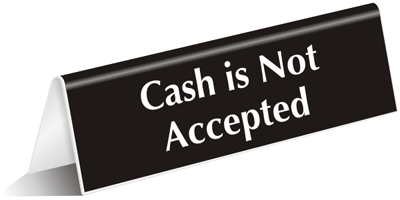
If you have done the relevant checks and found a reliable tenant, who consistently pays their rent on time, then you have hit the rental jackpot. Your money will be in your account every month and your investment has been a success.
 However, if, for whatever reason, your tenant doesn’t want to play ball, then you can find rent collection to be a difficult time and you may even find yourself out of pocket.
However, if, for whatever reason, your tenant doesn’t want to play ball, then you can find rent collection to be a difficult time and you may even find yourself out of pocket.

Rent collection can be rather stressful, especially if your tenant is prone to making late or, on some occasions, no payments at all. So it’s a good idea to organise your rent collection to make it as stress-free as possible.
This handy guide will help you to find the best form of rent collection that works for you.
1. Cheque

I will place this in here tentatively, as cheques are becoming increasingly diminished and their extinction is imminent. However, for the time being, you can still collect rent via cheque.
You must be aware that they will need to be either collected or posted. This means that there is likely to be a delay in actual payment, especially since the cheque will need so many business days to clear. Cheques can also bounce and then you will be left with no rental income for that month unless an alternative rent collection can be organised.
Many people do not even have chequebooks anymore, as they are largely outdated. So you might be making it even more difficult for your tenant to pay their rent.
If I were you I would just skip this one and move on to the next idea, but I will leave it here to give you the option…
Read this handy guide to give you a rundown of cheques and their availability…
2. Standing Order Vs Direct Debit

An automatic payment is a great way to just ‘set it and forget it’. Rent payments are automatically collected every month of a pre-specified day and transferred without fuss to the landlords’ account.
The difference between a standing order (SO) and a direct debit (DD) is simply that with a SO the landlord cannot amend the price taken from the tenants each month. The tenant can be confident in the fact that their rental payments will be consistent in terms of ‘how much’. A DD can be altered by the landlord and the tenant could find themselves paying more than expected each month.
So a standing order is the preferred form of the rental collection as it keeps things simple and consistent throughout the whole process.
Find out more here:
A Direct Debit Collection Guide for Landlords
Direct Debits and Standing Orders
3. Keeping Away from Cash

Although many landlords do deal in cash, it really isn’t the safest way to handle rental payments.
There is a looming possibility that the cash is fraudulent and fake. If this is the case, you won’t know until the cash has been checked at the bank. By then your tenant could not have the funds to pay the extra and may not have even known the money was fake, to begin with.
If you are determined to deal with cash then make sure that the full amount is counted with the tenant present. Make sure that you provide receipts for both yourself and your tenants and that both receipts are signed by everyone involved. This ensures that everyone is in agreement and nothing can be disputed at a later date.
The biggest issue with cash payments is the lack of security and paper trail. There are too many potential issues which, when we are talking about large amounts of money, is possibly too big a risk to take.
So unless you absolutely have to, I would recommend that you stay away from cash payments….
Related Articles
Key Facts to check out before handing over cash to a private landlord
Cash-in-hand deals can cost you a packet
4. Property Manager

You could always hire a property manager. They take care of rental payments leaving you completely stress -free! However, they wouldn’t just deal with rent collection, they would also deal with many other aspects of being a private landlord, including finding and screening tenants, taking care of the property and the tenants, and dealing with the legal side of things, to name a few of their responsibilities.
This is a rather costly form of rent collection, as you are likely to end up paying for additional services you may not have wanted or needed. It would be worth searching around for different property management companies and what they can offer you.
Find out more here:
Why should I hire a property management company?
What are property management fees and how much do they cost?
How to choose a property management company
5. Rent Collection Scheme
Rather than paying a large amount for someone to take over all of your responsibilities as a landlord, you could sign up to a rent collection scheme. There are loads of different varieties out there, so it is a good idea to do a bit of research and find out which one works for you.
TheHouseShop.com offers a super powered rent collection tool that acts as an incentive to tenants who are rewarded for their online payments with an improved credit score.
RentScore
 For as little as £14.99 a month, RentScore completely takes care of your rental income. They organise a direct debit with your tenants and your payments are processed on the same working day! Simple and fast!
For as little as £14.99 a month, RentScore completely takes care of your rental income. They organise a direct debit with your tenants and your payments are processed on the same working day! Simple and fast!
RentScore makes rent a number 1 priority for tenants. With the possibility that they can increase their credit score, Rent Score acts as a motivator, providing an incentive for tenants to consistently pay their rent on time.
All payments are 100% safe and hassle-free, as RentScore takes all of the stress out of rent collection. All you have to do is fill out a simple form and then RentScore does the rest. Any late or missed payments are chased by them and you are notified every step of the way, keeping you in the loop without you having to do anything.
Find out all of the benefits of Rent Score here…
It is a win-win scenario where landlords can relax with the comforting knowledge that their rental payments are being taken care of, while tenants get the opportunity to increase their credit score and finally start a foundation for joining the property ladder.

So there are plenty of ways you can ensure that your rental income is consistent. Although it may seem stressful at times there are schemes in place that can take away the stress and let you enjoy your profitable investment.
The biggest tip I can give you is to be consistent. Whatever you choose, stick to it. If you constantly change how your tenants pay their rent, then they are more likely to become confused and lost in the transitions, meaning that they could end up missing or making late payments, which is precisely what we are trying to avoid here.
Having a solid method of rent collection in place is not only reassuring for yourself but also for your tenants, as they are confident that you are a professional private landlord who they can rely on.
Related Articles
RentScore, What’s in it for me?
How much rent should I charge my tenants?
New rent collection service aims to ‘minimise’ risk of late or missed payments[/vc_column_text][/vc_column][/vc_row][vc_row][vc_column width=”1/2″][vc_tweetmeme type=”follow” follow_user=”@RentScoreUK” large_button=”true”][/vc_column][vc_column width=”1/2″][vc_facebook][/vc_column][/vc_row]



 POSTED BY
POSTED BY 

